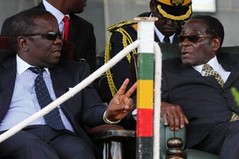
Prime Minister Morgan Tsvangirai and President Robert Mugabe of the Republic of Zimbabwe. The parties inside the country are working to finalize a new constitution under the Global Political Agreement.
Originally uploaded by Pan-African News Wire File Photos
Zimbabwe Herald
With the lifespan of the Global Political Agreement about to end, the Zimbabwean polity is anxious on the next move.
President Mugabe recently cleared the air when he said elections will be held mid next year, giving the GPA, due to end in February, an extension of about six months.
Some people had hoped the GPA would last the life of the present Parliament — five years — fearing that partisan election campaigns might rock the boat and disturb the prevailing peaceful political environment.
However, the GPA was never meant to last forever, as neither of the two main parties — Zanu-PF and MDC-T — was happy with the temporary arrangement.
Indeed, the inclusive Government, which came out of the GPA, has been seen as a marriage of convenience by both Zanu-PF and MDC-T.
To some, it has been seen as a desperate attempt to mix oil with water, an experiment that is always doomed to fail.
It appears the main point of departure between Zanu-PF and MDC-T is the former’s belief in sovereignty and self-determination and the latter’s apparent over-reliance on the West.
The latest letters by Mr Morgan Tsvangirai to the EU in particular, pleading the non-recognition of envoys reassigned by President Mugabe on the normal recommendation by the Ministry of Foreign Affairs, is a case in point.
True, Mr Tsvangirai has got every right to express his disapproval when decisions he is not happy with are made.
It doesn’t matter whether his judgment is informed or otherwise. What matters, however, is his reaction in his attempt to seek redress.
The Prime Minister declared the recent re-deployments and re-assignments a “constitutional crisis”.
But why did he appeal to the EU, among other centres, for intervention?
After all, if he felt the GPA had been breached, he knows fully well that Sadc and the African Union are the guarantors of this accord.
It looks like the MDC-T never learns.
Last time their secretary-general, Mr Tendai Biti, wrote a condescending letter to Sadc describing the organisation’s resolutions on Zimbabwe as “a nullity”.
Sadc-appointed facilitator Cde Thabo Mbeki’s reply should have been an eye opener.
He argued: “In this regard, they (MDC-T) have absolutely no need to refer to their external supporters for approval, whoever they might be, and however powerful they might seem . . .”
He further reminded them that Zimbabwe will never share the same neighbourhood with countries of Western Europe.
Even Professor Arthur Mutambara, who is a signatory to the GPA, wondered why a case Mr Tsvangirai deemed to be a “constitutional crisis” had to be referred to Europe instead of leaving it to the Zimbabwean Supreme Court, which is competent to address such issues.
Surely it appears it would need a lot of patience to extend the life of the GPA with a partner who has scant regard of internal mechanisms to solve disputes.
No wonder the so-called Government of National Unity is failing to operate at full throttle. As predicted, water and oil are failing to mix.
It is only fortunate that the then acting Minister of Finance, Cde Patrick Chinamasa, gave the inclusive Government a headstart by introducing the multi-currency regime.
This has at least brought some smiles to a good number of people.
But even then a lot of things have remained static.
How can there be progress when, while the whole world is aware of the illegal sanctions that are stifling development, a partner in the inclusive
Government is denying the existence of such an evil?
This is even after the then British Secretary for Foreign and Commonwealth Affairs, Mr David Miliband, told the House of Commons on January 19 2010, that the sanctions Britain had imposed on Zimbabwe would only be lifted at the request of the MDC-T.
How can there be progress when a vital institution like the Reserve Bank of Zimbabwe is left to go moribund just because a partner in the inclusive Govern-ment has a score to settle?
Our politicians might go to Europe, the UN, South Africa or any other country for that matter to solicit support.
However, they must always remember that it is the Zimba-bwean voters who have the final say.
With the imminent expiry of the GPA, soon Zimbabweans will be going to the polls to exercise their right to choose leaders of their choice.
President Mugabe has called for a peaceful election campaign. We expect Mr Tsva-ngirai to reciprocate.
No comments:
Post a Comment